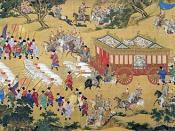Today George Bush is in Beijing ignoring all cries for freedom from oppression and persecution by a despotic fascist regime. To what extent is his argument that globalisation will open up China and bring in the light of freedom denied for so long?
Globalization resulted from the reduction of national trading borders and the formation of a world wide market economy. This has brought several economical but also social advantages and disadvantages for developing LEDC. In the case of China the influences of globalization have had an enormous impact.
Economical changes.
Before China in the 1970s opened its trading borders to the world, its domestic market was quite underdeveloped; comprised mainly of primary industry like steel production and agriculture.
It was then that foreign capital investment could be made which laid the foundations for its economic expansion in other industrial sectors. The cheap labor costs were an opportunity for foreign companies to produce products for little money and sell them to higher prices on the global market, increasing their profit.
These products were mainly primary goods/daily commodities such as clothing which didn't require a highly skilled labor force to produce. As the people in China weren't very educated, foreign companies gave them a chance for getting a simple job. The amount of money they received in return for their work may have seemed very little compared to western standards, but when put in relation to Chinese standards this money could already provide an existential foundation. But for this money people in many cases had to work under inhumane working conditions, such as working over 10 hours per day and even on weekends, with not receiving payment for a whole month if absent for just one day or not having provided any sufficient safety precautions in the working environment which...


